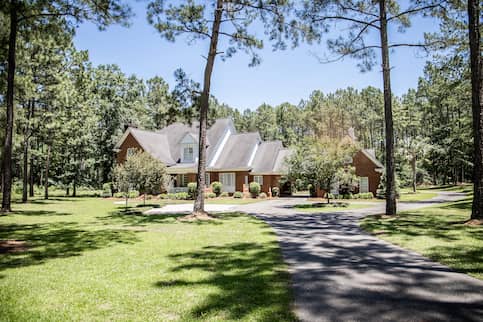If you’re shopping for a home or property to build a house on, you might have heard the term “landlocked” used. But what does it mean regarding real estate? The word landlocked is used to describe a property that is surrounded by lots owned by different people and so doesn’t have access to a road.
In this article, we’ll take a closer look at the definition of landlocked, and what implications it might have on any real estate transactions (including the purchase of a new parcel of land) that you might be considering.
What Is A Landlocked Property?
In real estate terms, landlocked refers to a piece of property that has no legal access to a public road. In other words, it’s surrounded by lots owned by other individuals or entities and the only way to travel to it is by crossing one of your neighbors’ properties.
How Does Landlocked Property Work?
An example of a landlocked property might be one that’s in a remote rural wooded area, next to a lake or behind vacant land. If the only way to get to this piece of property were by crossing through your neighbor’s land, it would be considered a landlocked parcel.
That’s not to say landlocked property is unattractive, or that you should feel discouraged from buying it. A landlocked property doesn’t have to remain one permanently. After all, if you’re considering purchasing the parcel of land, you can always negotiate with neighboring landowners to obtain a right of way or easement which would allow you to build a road that runs through their property. Whether or not they’ll be amenable to it will depend on the situation. If they’re not, the process might require some legal wrangling.
Find A Mortgage Today and Lock In Your Rate!
Get matched with a lender that will work for your financial situation.
See What You Qualify For
Buy A Home
Discover mortgage options that fit your unique financial needs.

Refinance
Refinance your mortgage to have more money for what matters.
Tap Into Equity
Use your home’s equity and unlock cash to achieve your goals.
What To Know Before Buying Landlocked Property
Purchasing a piece of landlocked property can differ from buying a home with road access. On one hand, it’s often sold at a significant discount as there’s no direct roadway that allows you to visit your property. On the other hand, landlocked plots of land offer limited accessibility, and are often the result of owners subdividing parcels of their real estate holdings. This means they also come with more back-end strings attached.
Put simply, if you buy landlocked property, odds are that you’ll need to secure an easement (which gives you the right to access someone else’s property) with at least one of your neighbors. If that doesn’t work, you may need to petition local officials for an access road.
How To Secure An Easement On Landlocked Property
An easement might give you the legal right to drive through designated portions of another person’s land, or grant permission for you to build an access road across their parcel that leads to your property.
Easements should be formally codified in signed writing, and your ability to obtain one will often depend on your neighbors’ willingness to play ball. Neighbors are often happy to allow you to pass through, especially in exchange for a small fee. If they’re not willing to negotiate though, you may have to file a lawsuit and go to court to obtain the easement.
To secure an easement in brief, you’ll need to:
- Hire a professional to conduct a property survey.
- Speak with the property owner whose land you’re seeking an easement on.
- Make the landholder an offer and negotiate with them.
- Meet with a real estate attorney to get advice, review deal terms and process any paperwork.
- Should negotiations fail, have your attorney sue to obtain access to your property.
- Secure a court order awarding you the easement.
It’s also important to note that with or without an easement, property taxes on the landlocked parcel are still the new landlocked property owners’ responsibility.
How To Choose The Right Type Of Easement
Before purchasing a landlocked property, you should understand that there are multiple types of easements that can be used in different situations. Knowing what easement you can use could help prevent future issues and streamline the legal process.
Right Of Way Easement
A right of way easement lets you travel through another party’s property – helpful if you need to pass through, say, a paved road or dirt track running through their land. Alternatively, it might allow you to build a driveway through their land that leads right up to your front door.
This is the most straightforward way to gain access to your new landlocked property. Unfortunately, your neighbor might not grant you this type of easement.
Easement By Necessity
If your neighbor won’t grant you a right of way easement, you may have to ask for an easement by necessity. Effectively, it’s a court order that awards you the access that you need to your property through someone else’s land.
To gain an easement by necessity, you’ll need to speak with an attorney and have them file a lawsuit so you can obtain a court order. Filing such a lawsuit is often time-consuming, costly and stressful – and will do little to improve neighborly relations. If you can strike a deal, it generally pays to talk things out before turning to the legal system.
Implied Easement
While an easement by necessity can be a solution to your landlocked property, you may be able to opt for an implied easement – sometimes called an easement by implication – to help avoid a legal battle with your neighbors.
An implied easement could be used if the former property owner created the landlocked parcel by dividing their land into smaller pieces. In this situation, the owner most likely intended to include a right of way easement, but forgot to document it in the sale. If so, the new owner could create an implied easement to gain access to the landlocked property.
Prescriptive Easement
Another option new owners can use to gain the right to access their property is through adverse possession to create a prescriptive easement or easement by prescription. This type of easement can be granted if the owner can legally argue that the neighboring property has been continuously used to gain access to the landlocked parcel.
For instance, if you buy a landlocked property where the previous owner used the neighbor’s driveway to gain access to the parcel for the last decade, you could ask for an easement by prescription. But the previous owner must have used the driveway openly, continuously and without the neighbor’s permission in order to qualify for this easement.
Home Affordability Calculator
Calculate the home price you can afford using your income and the amount of debt you have.
Pros And Cons Of Landlocked Property
As with any real estate purchase or investment, landlocked property comes with benefits and drawbacks attached.
Pros Of Landlocked Property
If you buy a landlocked parcel, you could enjoy the following benefits:
- Due to the lack of convenient access to the land, landlocked property frequently comes at a lower cost.
- As a new landowner, you will get the opportunity to learn more about the area from the surrounding landowners. This includes property lines, surrounding wildlife, local traffic, etc.
- New landowners will also have the possibility to expand or change the landlocked property in some way if a positive relationship is established with the neighbors surrounding the land.
Cons Of Landlocked Property
You might also experience these drawbacks as a landlocked property owner:
- It may take added time, expense and hassle to obtain access to your land through easements.
- There’s a high chance that another property owner could end up wanting to extend their land and purchase other parcels of landlocked land around you.
- Ongoing challenges may arise, especially in terms of having to negotiate and work with your neighbors when you want to change the land in any sort of way.
Should You Buy A Landlocked Property?
Sometimes, the perfect parcel of land for you is situated in a remote rural escape or distant woodland area that just hasn’t been developed yet – or is surrounded by others’ properties.
Without a road leading to it or means of access apart from crossing over other owners’ real estate, it becomes landlocked property. This isn’t to say that you can’t obtain the ability to change that status. You’ll just have several added variables to consider as you go about purchasing landlocked property versus making your average real estate purchase.
Don’t forget that landlocked property tends to be cheaper due to its inaccessibility. Noting this, it’s a potential investment property venture that you’ll want to consider – albeit, perhaps, not the type you’ll want to look at diving into if you’re a first-time real estate investor. Instead, buying a landlocked property may be a better choice for seasoned buyers or investors.
The Bottom Line: Landlocked Property Has Its Own Set Of Unique Challenges
Buying a landlocked parcel can be an attractive investment, but it can also come with legal issues. If your neighbor doesn’t allow you an easement, you might need to retain an attorney and file a lawsuit. On the flip side, if you can secure an easement, you could purchase a plot of land at an affordable price.
Take the first step to buy a home.
Quicken Loans® lets you get to house hunting sooner.

Scott Steinberg
Hailed as The Master of Innovation by Fortune magazine, and World’s Leading Business Strategist, award-winning professional speaker Scott Steinberg is among today’s best-known trends experts and futurists. A strategic adviser to four-star generals and a who’s who of Fortune 500s, he’s the bestselling author of 14 books including "Make Change Work for You" and "FAST >> FORWARD." The CEO of BIZDEV: The Intl. Association for Business Development and Strategic Planning, his website is www.AKeynoteSpeaker.com.












